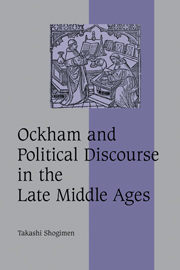Book contents
- Frontmatter
- Contents
- Preface
- List of abbreviations
- INTRODUCTION
- 1 THE POVERTY CONTROVERSY
- 2 A GENERAL THEORY OF HERESY
- 3 THE PROBLEM OF PAPAL HERESY
- 4 PAPAL PLENITUDO POTESTATIS
- 5 PETRINE PRIMACY
- 6 THE DEFENCE OF HUMAN FREEDOM
- Appendix: Ockham's ‘Dialogus’ and Marsilius' ‘Defensor pacis’
- Bibliography
- Index
- Cambridge Studies in Medieval Life and Thought Fourth series
1 - THE POVERTY CONTROVERSY
Published online by Cambridge University Press: 23 July 2009
- Frontmatter
- Contents
- Preface
- List of abbreviations
- INTRODUCTION
- 1 THE POVERTY CONTROVERSY
- 2 A GENERAL THEORY OF HERESY
- 3 THE PROBLEM OF PAPAL HERESY
- 4 PAPAL PLENITUDO POTESTATIS
- 5 PETRINE PRIMACY
- 6 THE DEFENCE OF HUMAN FREEDOM
- Appendix: Ockham's ‘Dialogus’ and Marsilius' ‘Defensor pacis’
- Bibliography
- Index
- Cambridge Studies in Medieval Life and Thought Fourth series
Summary
Ockham's first polemical work does not owe its title to the author. It is today called the Opus nonaginta dierum (The Work of Ninety Days), since it was probably written within three months in the period between February 1332 and the beginning of 1333. The work was devoted to the refutation of John XXII's decree Quia vir reprobus (1329). The Opus nonaginta dierum emerged from the bitter battle of words over apostolic poverty.
This work, however, had long failed to attract modern scholarly attention beyond the circles of medieval ecclesiastical historians until Jürgen Miethke highlighted in the work all the seminal ideas of Ockham's later ecclesiology. It is now widely recognised that the Opus nonaginta dierum presents Ockham's ideas on natural law and natural right. This should not lead us to think that the Opus nonaginta dierum is a systematic treatise on legal theory. It cites the papal bull and presents the opinions of the anti-papal ‘attackers (impugnantes)’ in an ‘impersonal’ format, responding to the whole papal bull, sentence by sentence, phrase by phrase, and even word by word. The Opus nonaginta dierum was clearly not written as a system of ecclesiological or legal theory but as a series of responses to the issues raised by the pope.
What did Ockham intend in writing the Opus nonaginta dierum? The circumstances appear to show that he was simply defending the Franciscan case.
- Type
- Chapter
- Information
- Ockham and Political Discourse in the Late Middle Ages , pp. 36 - 74Publisher: Cambridge University PressPrint publication year: 2007

